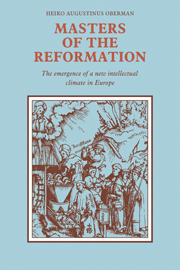Book contents
- Frontmatter
- Contents
- Preface
- Abbreviations
- Map
- PART I INTELLECTUAL RENEWAL
- PART II THE GRAPES OF WRATH
- PART III NEW JERUSALEM WITHIN THE OLD WALLS
- 10 Magistri and magistracy: the old and new masters
- 11 The great visitation: bishop and city
- 12 The onset of the Counter-Reformation
- 13 The Reformation: a German tragedy
- Student population at German universities 1385–1540
- Chronological outline
- Bibliography
- Index of names and places
- Index of modern authors
- Subject index
12 - The onset of the Counter-Reformation
Published online by Cambridge University Press: 07 October 2011
- Frontmatter
- Contents
- Preface
- Abbreviations
- Map
- PART I INTELLECTUAL RENEWAL
- PART II THE GRAPES OF WRATH
- PART III NEW JERUSALEM WITHIN THE OLD WALLS
- 10 Magistri and magistracy: the old and new masters
- 11 The great visitation: bishop and city
- 12 The onset of the Counter-Reformation
- 13 The Reformation: a German tragedy
- Student population at German universities 1385–1540
- Chronological outline
- Bibliography
- Index of names and places
- Index of modern authors
- Subject index
Summary
The revolt of the ‘new masters’ produced more than mere consternation on the part of the old. Johannes Fabri was sufficiently impressed by the potential of a Christian assembly such as he had experienced in Zürich to fall back on a variation long legitimate in church law, the diocesan synod, as a weapon against the threatened erosion of the authority of the church of Rome. The deliberations of an assembly of the bishops of the south German dioceses seemed most likely to prove effective against the mounting heresy. We do know that the bishops of Constance, Augsburg and Strassburg assembled in Tübingen in May 1523, although the report of this session gives no further details.
The plan to convene the clergy of various areas may have been discussed there. Fabri reported to the Constance cathedral chapter on 30 July 1523 concerning this proposal. He related that he had summoned the parish clergy of all Württemberg to Tubingen and Esslingen and impressed the provisions of the Edict of Worms and the decree of the Diet of Nuremberg on those assembled. Represented by a committee, the Württemberg clergy accepted the mandates against the Lutheran heresy ‘submissively and with good will’, reporting that only a few within their ranks were ‘followers of the Lutheran sect’. At the same time they considered assistance by the authorities in suppressing the ‘sectarians’ to be most desirable.
- Type
- Chapter
- Information
- Masters of the ReformationThe Emergence of a New Intellectual Climate in Europe, pp. 240 - 259Publisher: Cambridge University PressPrint publication year: 1981



